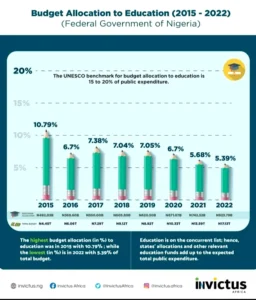Against the backdrop of the Academic Staff Union of Universities, ASUU, strike, a report released by an advocacy group, Invictus Africa, on Tuesday, disclosed that the educational sector received its lowest budgetary allocation in 2022.
The report entitled, “Data and Analysis of the Federal Government of Nigeria’s Budgetary Allocation to Education between 2015 and 2022,” pegged the federal government’s budgetary allocation to education at 5.39 percent, accounting for N923.79 billion out of the total budget of N17.13 trillion.
The report further revealed that the 5.39 percent was a 50 percent reduction from the 10.79 percent allocated to education in 2015.
It said, “The Federal Government’s 2022 budgetary allocation to education is 5.39 percent, which is N923.79 billion out of the total budget of N17.13 trillion. This is being expended on personnel (N662.7 billion), overheads (N38.8 billion), and capital expenditure (N222.2 billion).
“The 5.39 percent allocation is not only a minuscule 0.29 percent increase from the 2021 budget in which 5.68 percent was allocated to the sector, it is the lowest percentage allocation to education by the Federal Government in the last ten years.
“Further considering that the 5.39 percent is a 50 percent reduction from the 10.79 percent allocated to education in 2015, a comparative estimate of the Naira value of these percentages, when subjected to dollar exchange, shows only a slight difference between the 2015 allocation and that of 2022.
“Considering that education is on the concurrent list in the Nigerian Constitution, to ascertain the percentage of total public expenditure on education in Nigeria, different sources of funds must be put into consideration, such as budget allocations by States and the Federal Government, and the Tertiary Education Trust Fund (TETFund), among others. This data, however, only shows the Federal Government’s allocation to education.”
Giving her remarks on the data, the Executive Director of Invictus Africa, Bukky Shonibare, decried the negative cascading effects of the low budgetary allocation to education by the federal government.
She said, “The need for better funding of FG owned public universities is one of the many issues causing the seemingly endless strike actions by the Academic Staff Union of Universities, ASUU.
“The current ASUU strike has been on since February 14, 2022, halting tertiary education for many students.”
Shonibare noted that budgetary allocations indicates governments’ priorities and political will, adding that an increase in education budgeting will mean that more schooling population across Nigeria can access free, safe, and quality education, while increasing the chances for uptake of secondary and tertiary education.
“Governments’ investment in education is not only in fulfillment of its obligation to fulfill the right to education, it is strategic, as investing in education is directly linked to, among others, reduction in poverty and crimes, as well as improvements in Nigeria’s economic potential and capacity,” she stated.







